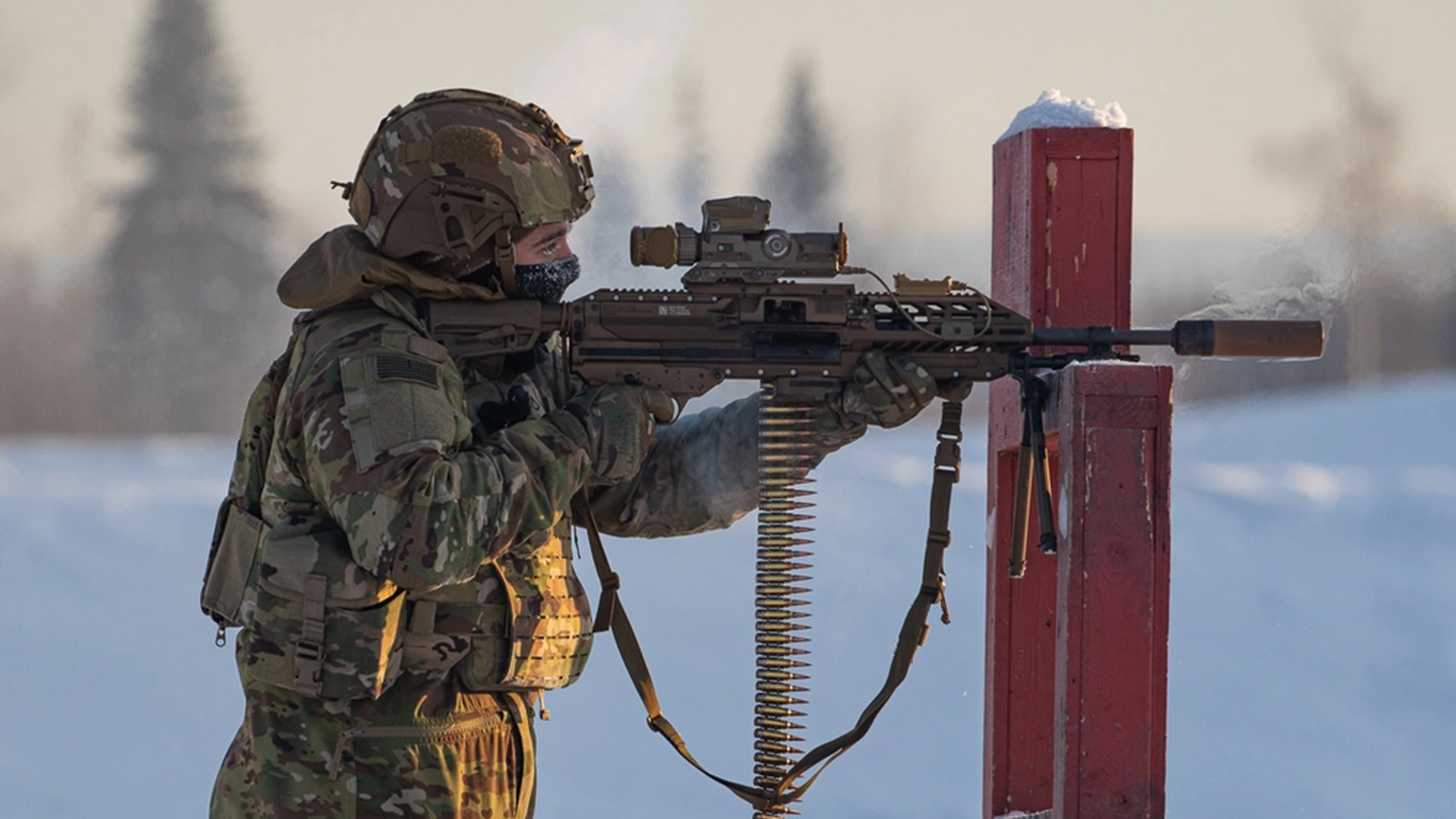

Soldiers with the 101st Airborne at Fort Campbell, Kentucky are the first to receive the Army’s new Next Generation Squad Weapon (NGSW) system this week.
On Thursday, soldiers from the 1st Battalion, 506th Infantry Regiment were equipped with the NGSW ahead of April training where they will practice with new equipment, according to Army Futures Command. The training will involve a train-the-trainer course to prepare NCOs to conduct follow-on training across the company.
The Army also plans to field NGSW systems to a National Guard armored brigade in May.
The two NGSW rifles, which increase lethality at longer ranges, will be used by close combat forces which have historically sustained “80% of the casualties in combat,” according to Brig. Gen. Larry Burris, commander of the Army Infantry School and Army Maneuver Center of Excellence in a brief to reporters in 2022. Other forces will continue to use the M4 and the M249 weapons systems.
“For example, the company supply sergeant will continue to carry [an] M-4 or another weapon, not the Next-Gen Weapon,” Burris said.
The XM7 will be the new personal weapon for soldiers across the Army and replace the ubiquitous M4 rifle, which has designs originating from M16s used by Vietnam War soldiers. The XM250 will replace the M249 Squad Automatic Weapon, a 1980s-era gun.
The XM7 weighs around 8.4 pounds, which is slightly heavier than the M4, weighing about 7.3 pounds. The XM250 is about 12 pounds, significantly lighter than the SAW, which weighs approximately 18 pounds.
When it comes to firing, the XM7 and XM250 rifles are designed to use a larger and heavier bullet size “with improved armor-penetrating capabilities,” according to Fort Campbell’s public affairs.
“There’s fewer rounds required for the soldier to carry,” Lt. Col. Micah Rue, product manager for soldier weapons at the Army’s Program Executive Soldier office, told Task & Purpose. “They don’t need as many as they needed in the past to neutralize the target. But if you look at the round itself, it’s actually a more substantial round.”
The new weapons will use 6.8mm ammunition while previous weapons used 5.56mm ammunition.
First new weapon ‘in 65 years‘
Officials began the NGSW development process after a 2017 study “recognized the need for weapons that will perform better at range,” according to AFC.
The Army has used over 25,000 hours to develop and test the NGSW system with soldiers, including those from the Kentucky base who were the first operational users of the XM7 rifle and the XM250 in September.
The Army also did natural environment testing in extreme cold and hot, tropical environments after studies in a closed, simulated environment where researchers take the weapon, put it in a freezer, let it soak overnight, and then shoot it for testing, Rue said.
With the help of several Army offices and private companies like Sig Sauer and Vortex, the Army was able to “deliver on schedule as promised,” despite “challenges, setbacks, and speed bumps,” Lt. Col. Mark Vidotto, lead of the NGSW for the Soldier Lethality Cross-Functional Team at Fort Moore, Georgia, said in a press release.
Subscribe to Task & Purpose today. Get the latest military news and culture in your inbox daily.
The rifles are a generational shift for the Army which will begin to retire its older inventory of personal and squad weapons with designs dating back to the Vietnam-era.
“This is the first time in our lifetime, the first time in 65 years the Army will field a new weapon system of this nature, a rifle and automatic rifle, a fire control system and a new caliber family of ammunition,” Burris told reporters in 2022 after the Army awarded a 10-year contract to Sig Sauer for weapon production.
“This is revolutionary,” Burris said, adding that the Army used rapid acquisition authorities for a process that “may have taken eight to 10 years to complete,” but instead took “roughly 27 months.”
Commander of the Army’s office for armaments and ammunition at Picatinny Arsenal, Brig. Gen. William Boruff, told reporters that fielding the weapons to certain units would be based on ammunition availability. The production of new ammo, he said, requires the Army to start a new industrial base – an issue the entire Department of Defense has struggled with while supplying Ukraine with enough munitions and maintaining its own stockpiles simultaneously. A combination of increased demand for munitions and older, dried-up production lines has led the DOD to establish new facilities and billion-dollar, multi-year contracts with defense contractors.
The Army set up a plan to produce the new ammunition at a contractor-operated Lake City Army Ammunition Plant in Missouri. After seven to eight years, the Army plans to take the production lead with Sig Sauer as a second source.
“The NGSW fielding is a culmination of a comprehensive and rigorous process of design, testing and feedback, all of which were led by Soldiers,” said Col. Jason Bohannon, project manager at PEO Soldier. “As a result, the Army is delivering on its promise to deliver to Soldiers the highest quality, most capable small-caliber weapons and ammunition.”
The latest on Task & Purpose
- Air Force fires two medical commanders at Joint Base Charleston
- Navy fires commodore of Naval Special Warfare Group Eight
- Families at Edwards Air Force Base living in RVs for housing relief
- Niger cuts ties with US military
- Navy has fired at least 3 commanding officers for DUIs in 2024